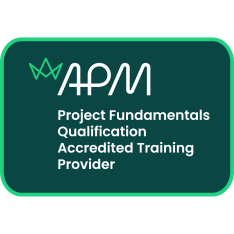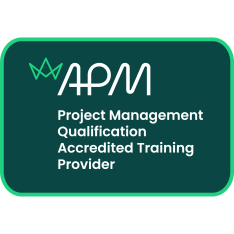APM Project Management Qualification (PMQ) Course Outline
The APM Project management qualification (PMQ) syllabus is based upon the APM Body of Knowledge 7th edition. Throughout this 5-day training course you will gain a broad level understanding of project management knowledge to be able to participate in projects from individual level to large organisational projects.
Module 1: Life Cycles
- Understand Distinct Life Cycle Stages Used to Structure Projects
- Differences Between a Project Life Cycle and an Extended Life Cycle
- Influence of Organisational Context and Culture, and Specific Project Needs on Life Cycle Choice and Adaptations
- Strengths and Limitations of Different Life Cycles
Module 2: Governance Arrangements
- Understand Governance Structures Aligning with Organisational Practice(Different Types of Organisation Structures and Their Feature)
- Roles Within Project Management and Responsibilities of Each Role
- Importance of Project Management Governance Aspects
- Impact of a Project’s Life Cycle on Its Governance Framework and Financial Authority Limits
- Linking Projects to an Organisation’s Objectives
Module 3: Sustainability
- Sustainability Responsibilities, Principles, Priorities, and Their Impact on Projects
- Monitoring and Reporting on Sustainability Measures
Module 4: Business Case
- Tools and Techniques Influencing a Project’s Business Case
- Importance of Reviewing Changes Impacting the Business Case
- Business Case as the Project Baseline
Module 5: Procurement
- Importance and Purpose of a Procurement Strategy
- Stages of Supplier Selection and Procurement Planning
- Features of Different Contractual Relationships
- Methods of Supplier Reimbursement and Their Applicability
Module 6: Reviews
- Benefits of Conducting Reviews Throughout the Life Cycle
- Factors Typically Reported to Ensure Successful Outcomes
- Importance of Producing Information for Decision-making
- Re-planning Activities Post-review
Module 7: Assurance
- Purpose of Assurance and Awareness of Its Scope, Priorities, and Strategic Aims
Module 8: Transition Management
- Requirements for a Successful Transition
- Importance of Knowledge Transfer and Continuous Improvement
- Engaging Stakeholders in Transition Planning
Module 9: Benefits Management
- Monitoring Benefit Realisation Throughout a Project
- Meaning, Importance, and Communication of Benefits Management
Module 10: Stakeholder Engagement and Communication Management
- Working with Internal and External Parties to Achieve Project Outcomes
- Relationships Between Stakeholder Analysis, Influence, and Engagement
- Benefits of a Communication Plan and Managing Stakeholder Expectations
- Range of Communication Methods and Tailoring Messaging
Module 11: Conflict Resolution
- Identifying and Addressing Differences Within a Project
- Sources and Impacts of Conflict
- Approaches to Address Conflict in Various Situations
Module 12: Leadership
- Impact of Leadership on Team Performance
- Necessity of Varied Leadership Styles
- Importance of a Coaching and Mentoring Style
Module 13: Team Management
- Stages of Team Development and Influencing Factors
- Models Used for Understanding Team Development
- Characteristics and Benefits of Effective Teams
- Leadership Approaches for Virtual and Hybrid Teams
Module 14: Diversity and Inclusion
- Building an Inclusive Environment Embracing Diverse Culture
- Knowledge of Diversity and Its Workplace Impacts
- Importance of Incorporating Diversity in All Project Parts
- Addressing Conscious and Unconscious Biases
Module 15: Ethics, Compliance and Professionalism
- Importance of Continuing Professional Development
- Specialist Advice and Standards for Project Adherence
- Impact of the Legal and Regulatory Landscape on Projects
Module 16: Requirements Management
- Capturing and Monitoring Project Requirements
- Establishing and Managing Scope Through Requirements Management Processes
Module 17: Solutions Development
- Evaluating and Prioritising Requirements
- Different Approaches for Different Life Cycle Models
Module 18: Quality Management
- Ensuring Outputs Meet Set Requirements
- Quality Planning and Control Techniques
Module 19: Integrated Planning
- Incorporating Multiple Plans into a Project Management Plan
- Importance of an Integrated Schedule Management Plan
Module 20: Schedule Management
- Time-based Planning Focusing on Activities and Resources
- Defining Scope, Managing Dependencies, and Optimising Schedules
Module 21: Resource Management
- Identifying and Scheduling Required Resources
- Organisational Breakdown Structure and Responsibility Assignment
- Resource Categorisation and Allocation
- Differences Between Resource Smoothing and Resource Levelling
Module 22: Budgeting and Cost Control
- Estimating Costs, Agreeing Budgets, and Monitoring Finances
- Budget Creation and Refinement
- Financial Performance Monitoring and Reporting
- How to Close Down Finances at the End of a Project?
Module 23: Risk and Issue Management
- Identifying Risks and Planning Responses
- Benefits of Risk and Contingency Planning
- Stages of Risk and Issue Management Processes
- Why Governance is Important in Risk and Issue Management?
Module 24: Change Control
- Stages of Change Control Processes
- Recognise Differences in Change Control Between Linear and Iterative Cycles
- Assessing and Justifying Changes
- Justify Decisions on Change Requests
- Update Plans and Schedules to Reflect Changes










































 Back to course information
Back to course information






 If you wish to make any changes to your course, please
If you wish to make any changes to your course, please

